Beyond Reasonable Doubt
Select Format
Select Condition 
Book Overview
More than forty years have passed since Louis Jacobs first put forward the argument that traditionally observant Jews have no reason to take issue with the results obtained by the historical critics in their investigation into the Bible and the other classical sources of Judaism. In his numerous works on Jewish theology and in lectures worldwide, Jacobs has argued that the traditional doctrine which claims that 'the Torah is from Heaven' can and should be maintained -- provided that the word 'from' is understood in a non-fundamentalist way to denote that there is a human as well as a divine element in the Torah: God revealing His will not only to but through the Jewish people in their historical experiences as they reached out to Him.
As a result of these views, which were first published in the still-controversial text We Have Reason to Believe, the Anglo-Jewish Orthodox hierarchy banned Jacobs from serving as an Orthodox rabbi. This was the cause of the notorious 'Jacobs affair', which culminated in the creation of the New London Synagogue and, eventually, in the establishment of the Masorti movement in the UK with strong affinities with Conservative Judaism in the United States.
In this book, Louis Jacobs examines afresh all the issues involved. He does so objectively but with passion, meeting the objections put forward by critics from the various trends within the Jewish world, both Orthodox and Reform, and inviting readers to follow the argument and make up their own minds.






